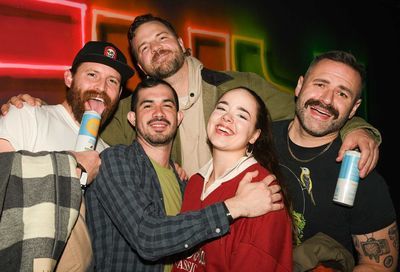‘Drive-Away Dolls’ Is An Obscenely Funny Delight (Review)
Ethan Coen and Tricia Cooke serve up an outlandish, hilarious lesbian road comedy with "Drive-Away Dolls."

Laughter is always welcome in these grief-soaked times, but laughter that’s triggered by the perverse wit of a Joel and/or Ethan Coen screenplay? That’s an increasingly scarce resource.
It’s been eight years since the Tinseltown hijinks of Hail, Caesar!, the Coens’ last proper comedy. After that, they made the Western anthology film The Ballad of Buster Scruggs, then went their separate ways.
Joel went full Shakespeare in 2021 with The Tragedy of Macbeth, an expressionistic exercise that was never quite more than the sum of its parts, while his brother took a hiatus from narrative filmmaking. Rumors swirled that the younger Coen “didn’t want to make movies anymore.”
Given those worrying headlines, Drive-Away Dolls feels like a gift from gay heaven. Dolls — which Ethan Coen directed from a script he wrote with his wife, longtime editor Tricia Cooke — is an outlandish lesbian road comedy loaded with madcap dialogue, inky-black humor, bumbling criminals, quirked-up regional accents, distinctive visual flourishes, and other Coen-coded hallmarks we’ve sorely missed. It’s an obscenely funny, and sometimes just plain obscene, delight.
The film is billed as Coen’s solo directorial debut, though that phrase requires some caveats. 1) It’s actually his narrative debut, following a Jerry Lee Lewis documentary. 2) By Coen’s own admission, Cooke served as co-director, but, because of Guild restrictions, is not credited as such.
Her involvement is crucial here, because she brings to Drive-Away Dolls an intimate knowledge of “dyke bars,” lesbian situationships, and all-girl slumber parties. (Cooke is a queer woman; she and Coen apparently have an open marriage; and the film’s intended title was “Drive-Away Dykes.”)
The story centers on two young lesbians — close friends, though not a couple — living in Philadelphia at the end of the ’90s, an age of Y2K puns and Ralph Nader jokes. Jamie (Margaret Qualley) is horny and impulsive, a Texas-bred goddess who calls people “honey darling” and reminisces about her sexual conquests with poetic vulgarity. (There was, for instance, that lady in New Hampshire who “got her tongue so far in me I swear it was gonna wriggle out my asshole.”)
Her friend Marian (Geraldine Viswanathan) is her opposite, a thoughtful introvert who reads Henry James novels and eschews crass one-night stands. Marian has plenty of affection for Jamie, but doesn’t share her burning desire to pick up strangers at bars with names like “The She Shed.”
After Jamie’s infidelity sparks the wrath of her soon-to-be ex-girlfriend, policewoman Sukie (Beanie Feldstein, always on the warpath), the two friends decide to roadtrip to Tallahassee, where Marian’s aunt lives. In need of a rental car, they visit Curlie’s Drive Away, a shady business staffed by the ornery Curlie (Bill Camp), who provides them with a Dodge Aries. “Is that a good car?” Marian asks. “Not really,” Curlie responds dryly.
In the kind of misunderstanding that has powered many a Coen brothers plot, this particular car contains a stolen silver briefcase, which results in a pair of imbecilic criminals pursuing the girls as they journey, haplessly unaware, into the Bible Belt. The film’s perverse mix of madcap road comedy and crime caper is reminiscent of Jonathan Demme’s Something Wild, albeit with a queer bent.
This road trip includes visits to small-town lesbian bars and a slumber-party makeout session, which Coen and Cooke tastefully soundtrack with Linda Ronstadt. Have I mentioned that this is the horniest Coen-adjacent movie by a mile?

The film’s sense of movement is propelled by its shifting scenery and crackling dialogue that will make you wonder if Ethan hasn’t been getting enough credit for the Coens’ bone-dry humor. The director, as ever, simply loves to hear his characters talk. Jamie and Marian bicker and banter. When Marian suggests enjoying some nature, Jamie retorts, “What’s a dyke bar — that’s not nature?”
Meanwhile, the criminals, played by Joey Slotnick and C.J. Wilson, squabble like toddlers in road scenes that wink back to 1996’s Fargo and its bickering kidnappers. (Coen-heads will spot another homage to Fargo in a recurring shot of a Juan Ponce de León statue, a Florida landmark.)
Then, of course, the girls find the briefcase, and the criminals catch up to them, and the film’s crisscrossing subplots collide in violent kismet. The Coens love a good MacGuffin, visually evocative and ultimately meaningless: the windswept hat in Miller’s Crossing, the rug that “really tied the room together” in The Big Lebowski. Here, it’s that fateful silver attaché case lurking in the trunk. I will not reveal what’s inside the case, except to say that it’s something that “belongs” to a Republican senator played by Matt Damon.

Damon is well-cast here — like Oppenheimer, this film understands that 53-year-old Matt Damon should be playing right-wing authoritarian scolds — but Qualley is the real breakout performance, a bolt of Southern-fried lightning. She relishes the role with the fast-talkin’, scene-stealing verve of Holly Hunter in Raising Arizona.
As you would expect from a movie co-written and -directed by its editor, Drive-Away Dolls is more visually inventive than the average buddy comedy. There are inspired wipe transitions — a character’s scream as he’s stabbed with a corkscrew seamlessly cuts into a cry of cunnilingus pleasure — and trippy, hallucinatory interludes in which a hippie seductress (Miley Cyrus, in a brief cameo) gyrates to Funkadelic’s “Maggot Brain.” There is also a sight gag involving red ribbon that I will be thinking about for a long time.
Drive-Away Dolls is refreshing not just because it’s deliriously, pervertedly funny, but also because it’s a zany, high-octane comedy of the sort the Coens haven’t made in a while. (Think Raising Arizona or Burn After Reading.) Maybe Joel and Ethan will reunite for another feature, as they recently teased. But let’s hope there’s also room for one more Coen-Cooke feature.
Drive-Away Dolls (★★★★☆) is now playing in theaters nationwide. Visit www.fandango.com.
Support Metro Weekly’s Journalism
These are challenging times for news organizations. And yet it’s crucial we stay active and provide vital resources and information to both our local readers and the world. So won’t you please take a moment and consider supporting Metro Weekly with a membership? For as little as $5 a month, you can help ensure Metro Weekly magazine and MetroWeekly.com remain free, viable resources as we provide the best, most diverse, culturally-resonant LGBTQ coverage in both the D.C. region and around the world. Memberships come with exclusive perks and discounts, your own personal digital delivery of each week’s magazine (and an archive), access to our Member's Lounge when it launches this fall, and exclusive members-only items like Metro Weekly Membership Mugs and Tote Bags! Check out all our membership levels here and please join us today!

























You must be logged in to post a comment.